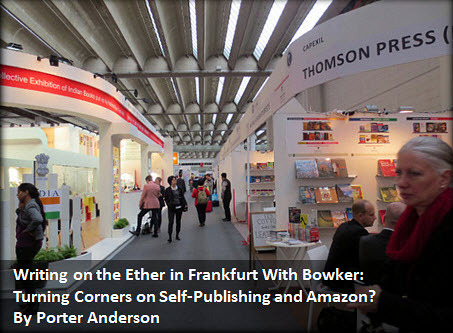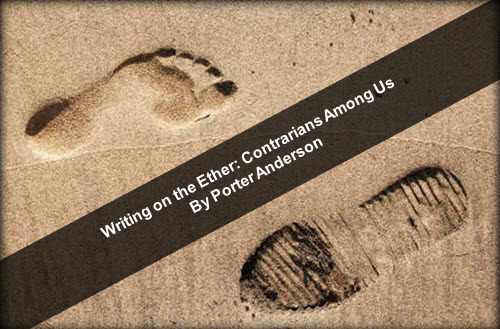Jane Friedman's Blog: Jane Friedman, page 170
October 17, 2013
Writing on the Ether: Reaching for the “New Book”
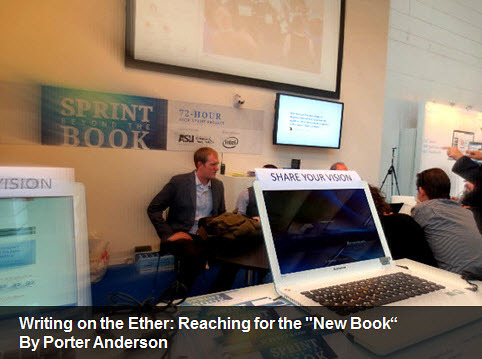
The Sprint Beyond the Book team at work during Frankfurt Book Fair.
Table of Contents
Covering a Sandstorm…While Standing in It
An Agile Conversation
The “Why Am I Here?” Question
Author-ity, Itself, in Question
Sprints are Special, Not the Rule
Covering a Sandstorm…While Standing in It
Several things make the Frankfurt Book Fair simultaneously exhilarating and nightmarish, particularly if you’re there to cover it.
 I had the pleasure of working the Fair last week with the Publishing Perspectives team, which somehow puts up with each Tuesday’s Ether for Authors. We were the ones darting around from event to interview to photo op, as were our good colleagues from London’s The Bookseller in the next-door office.
I had the pleasure of working the Fair last week with the Publishing Perspectives team, which somehow puts up with each Tuesday’s Ether for Authors. We were the ones darting around from event to interview to photo op, as were our good colleagues from London’s The Bookseller in the next-door office.
Such an assignment is exhilarating because many, maybe most, of the world’s best and most engaged, busy, experienced, insightful, and successful people in and around publishing are there, all at once, along with the rest of the publishing press corps.
It’s also nightmarish because that conclave of so many fine folks is a little like one of those dreams in which everybody you know seems to have turned up at one strange house party, and you’re supposed to be conversant with everything on everyone’s mind. (Don’t tell me I’m the only one who has these dreams, just let me go on thinking we all do.)
You fly out of Frankfurt, in fact, with a sizable list of important people and longtime friends you didn’t get to see. What was that crowd of 275,000+ others doing in the way?

The HarperCollins pavilion at Frankfurt Book Fair 2013. Photo: Porter Anderson
The frustration, of course, is in trying to detect trends in the industry! the industry! while it’s being buffeted by this sandstorm of digital change. As The FutureBook’s Sam Missingham wryly tweeted, “So, have read a few articles post-Frankfurt. Do we really think subscription models were the big talking point?” (They weren’t.)
As Hugh Howey has noted in The World of Books—a fond post from Paris about seeing non-U.S. publishing interests and people at work—Frankfurt is roughly eight times the size of New York’s BookExpo America (BEA). From Fiction and Nonfiction in Hall 4.1 to Brazil’s special setup as Guest of Honor (next year Finland) to the Agents’ and Scouts’ encampment (“LitAg”) in Hall 6.0 to the International Publishers in Hall 8.0 and from the outdoor Agora all the way back to the Galleria—you could get the idea that almost any one of our myriad issues in publishing might be the key focus of the whole thing.
This is why I found it unexpectedly refreshing when something new was created during the three industry-only days of the Fair, itself.
Ah, to be a deadline driven species …
— Craig Mod (@craigmod) October 16, 2013
Surrounded by booths and pavilions that proudly showed off drop-dead handsome book covers, looming famous-author faces, and branding, branding, branding, the “Sprint Beyond the Book” ensemble was subtly subversive.

The Sprint Beyond the Book team at Hall 8, N170, Frankfurt Book Fair 2013. Photo: Porter Anderson
After all, they weren’t selling anything. And while they used a good bit of their own branding to announce that the Arizona State University-based Center for Science and the Imagination was in residence, there were no café-sized deal-making tables. Unless I missed them, no tote bags, either.
Just one table with a group of five or six people hunched over their laptops writing fast and trying to concentrate while Frankfurt’s booming city of publishing roared around them. (Hall 8.0 was so loud that by Friday I was losing my voice from talking with folks over the din.)
I had a piece in our Show Daily about Beyond the Book on Friday. You can download the Daily here and a version of the story is online at Publishing Perspectives. Then I mentioned it Tuesday in the Ether in regards to the much longer-term effort that Berlin’s Adam Hyde has been leading in his Book Sprints program.
As I told Hyde in our exchange, the use by both programs of the term “sprint” seems to be coincidental and pragmatic. These efforts are completely independent, although logically aligned; certainly, in the idea of speed.

Two members of Adam Hyde’s Book Sprints for ICT Research team confer in Mata Paquena, Portugal. Photo supplied by Adam Hyde.
Next week, I’ll have a chance to hear Hyde’s latest observations in his presentation at Books in Browsers (#BiB13) in San Francisco. I’m looking forward to a chance to talk with him more about his new Book Sprints for ICT Research program funded by the European Commission.
I’m dropping in a shot here of that program’s first Book Sprint outing in Mata Pequena, Portugal, just so we all can get a snootful of that setting for a moment. The event ran nearly concomitantly with the Book Fair in Germany.
As grand as Frankfurt is, this pastoral retreat in Portugal was a part of publishing, as well. And look at it. Can this be bad news for books?
For now, I want to focus on some of the material that came out of the 72-hour Beyond the Book effort at Frankfurt. Because it gave us not only something we didn’t have when Frankfurt opened but also because it pulls together some important thoughts about a movement the day-to-day commercial side of publishing doesn’t have many chances to see yet.
This is not something Jonathan Franzen should read. What’s going on here reminds me of the restless, sometimes fretful experimentation in theatrical work that Peter Brook did at the Bouffes du Nord in Paris and Anne Bogart and Martha Clarke have done in New York.
The question is how we can allow the digital disruption to do no more than gradually morph the print book into an ebook replica?
Before going any farther, it’s good to say that we need not kick publishing for not being on top of this. Being all but blown away by the digital dynamic is plenty. You don’t blame people on a runaway train for not developing new modes of transportation.
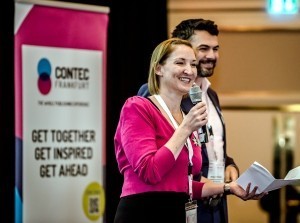
Kat Meyer and Holger Volland open Frankfurt Academy’s CONTEC Frankfurt 2013 Conference. Photo: Bernd Hartung, for Frankfurt Book Fair.
Even our self-publishers have their hands full. Many delegates to the Frankfurt Academy’s CONTEC 2013 Conference led by Kat Meyer and Holger Volland were engaged in that pivotal arena of contention—self-publishing’s escalating incursions into publishing overall.
In fact, if anything, the point Amazon’s Jon Fine made at CONTEC, which I wrote up Tuesday in Ether for Authors: Is It Time for Publishing to Call a Truce? is a good starting place for today’s inquiry.
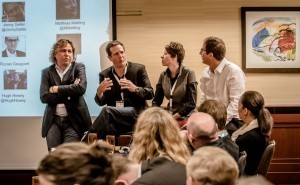
Half the panel in our Frankfurt Academy Self-Publishing and the Industry town-hall session: From left, Amazon’s Jon Fine, Silo Saga author Hugh Howey, Nelson Literary’s Kristin Nelson, and Curtis Brown’s Jonny Geller. Photo: Bernd Hartung, provided by Frankfurt Book Fair.
Fine was saying that hand-wringing over print vs. digital needs to give way to questions of books vs. the rest of the entertainment world, much of which has been digitally driven for quite some time.
This is how Fine put it:
In a world where you have so much competing for your attention—movies, music, video games, the whole nine yards—to make it as easy as possible for people to get to books, both buying them and then accessing them after they buy them, is huge. It’s absolutely essential as we move forward.
The place this pushes us is into that booth in Frankfurt with Beyond the Book. To react to the seductive, pulsing, beeping, interactive, mobile allure of entertainment choices arrayed before us today, is it enough to turn the book into something more glowy?
If we’re to get the most out of digital (before it gets the best of us), don’t we need to make it do more for us than 4G and backlighting and swiping to turn the pages? Is $1.99 vs. $2.99 vs. $9.99 the best place for our focus before we look harder at what we’re actually selling?
This is the other current of energy that was moving through Frankfurt, like self-publishing, with almost imperceptible persistence. A breeze of research, of curiosity. Worried playfulness.

Jennifer Rankin
It dovetailed with Jennifer Rankin’s piece in The Guardian, A new challenge to books – stories that follow you into the real world, pegged to the release of the interactive iPad thriller The Craftsman (with face-tracking software) from Julian McCrea and Mike Jones.
Rankin’s article refers to a French Revolution retelling of Frankenstein from Profile Books and inkle studios without mentioning that its author is Dave Morris of London. There’s an odd tendency among some in the industry to congratulate publishing firms willing to experiment without giving credit to the authors behind these new ventures.

Kate Pullinger
We also hear briefly from author Kate Pullinger— who, in part, is saying just that, that it’s authors who may be pushing forward more steadily than publishers. She tells Ranking that “ebooks are ‘not a very good copy’ of print books: a ‘transitional technology’ that will be ‘more webby’ in future.”
Pullinger, like Hyde, is presenting next week at Books in Browsers in San Francisco. Her talk is titled “Landing Gear: A Writer, A Novel, A Publisher, An API.”
And terms for these concepts “beyond the book” vary from “Web book” to “networked book” to “books in browsers” and other phrases that want to release a book to be whatever it needs to be.
If digital has taught us anything yet, it’s that its energies can blindside and reshape our work much more quickly that we expect at times, and in ways we inevitably wish we’d put more thought into earlier.
The winner of the 2013 #ManBookerPrize is The Luminaries by @EleanorCatton. Many congratulations! pic.twitter.com/eS0y7w9yIc
— Man Booker Prize (@ManBookerPrize) October 15, 2013
An Agile Conversation

Ed Finn
The Beyond the Book team writers were the ASU Center’s director Ed Finn; our own Jane Friedman of VQR and host of the Ether; author and ASU professor Dan Gillmor; author and Univeristy of Maryland assistant professor Lee Konstantinou; and Hugo-winning author Charles Stross.
The collection of essays was supported off-site by Intel’s Brian David Johnson and Exprima’s Corey Pressman (also speaking at Books in Browsers), but a glance at the project page shows that Friedman, Gillmor, Konstantinou, and Stross have contributed the bulk of the material, said to total about 25,000 words.
And as the group decamped Frankfurt, the work was stored here on the project page, as a simple and effective list of categorized short essays.
I liked the way Finn set up the issue when I interviewed him for Publishing Perspectives:
We realize we’re spending an incredible amount of effort trying to recreate the print experience online. And I think that’s a terrible mistake. Print books are a very mature tech. They don’t require a lot of power. They’re very durable. They’re easy to access. And we all understand how they work.
We’re missing the boat on all these incredible things that digital text can do that we don’t do right now. New types of collaborative texts, for example. Imagine sitting in a classroom and collaborating on a text, adding your notes, making your comments as you go through it together.
Referring to the Intel content-production platform the team was prototyping, Finn said, “Think of the ‘book’ as a performance space.” With that concept, he’d cornered my full attention.
Even the Booker Prize winners are younger than me these days. Still, come Christmas, I'll be younger than the new Doctor…
— alastair horne (@pressfuturist) October 15, 2013
The “Why Am I Here?” Question
What was going on behind Finn as we talked was the live generation of somewhat collaborative text, a group-writing effort that has produced a lot of potential litanies, calls and responses worth following.
Here, for example, is one way to put together some of the commentary produced.

Jane Friedman
Friedman – Why I’m Here — Jane Friedman
While the book has become a shadow of its former self partly because of how often the form has been exploited and overproduced for profit (for the slightest and most banal of ideas), mostly I just see it as a less compelling way— even a last resort — for sharing ideas.

Dan Gillmor
Gillmor – Why I’m Here — Dan Gillmor
As Charlie Stross put it earlier today, a basic function of a book is to convey ideas from an author’s brain to the brains of the readers. One of my goals here is to start to sort out the ecosystem(s) that will make that happen in years and decades to come.

Charlie Stross
Stross – Why I’m Here — Charlie Stross
I’m Charlie Stross. I write for a living, but I’ve got a dirty little secret; I don’t understand books…What does it mean for the function of a book, the transfer of information from an author’s mind into a reader’s, when the book becomes an easily transferable chunk of data not bound to a physical medium?

Lee Konstantinou
Konstantinou – Why I’m Here — Lee Konstantinou
We need to reimagine (and transform) publishing as a field, not just as an industry, from production to distribution to consumption…We shouldn’t simply submit to the market or to the allure of new technologies, but should make a new literary system that works for readers and writers.
Each of these excerpts is from its writer’s answer to the question “Why Am I Here?”
What i find interesting in them is that there’s evidence here of a desire for stability amid an arrival of new constructs. We read words such as “system,” “ecosystem,” “compelling way,” “function of a book.” These phrases reflect less a desire for the kind of creative chaos that might cause some to fear this work than for dependable paths to new places.
And from such excerpts, I think we can take away an understanding that some sort of intuitive destruction is less the goal than is thoughtful, exploratory change.
When a 28 year old novelist wins the Booker Prize, you know that anything is possible in fiction. Congrats to @grantabooks.
— Jonny Geller (@JonnyGeller) October 15, 2013
Author-ity, Itself, in Question
Of less reassurance, at least to writers, perhaps, is the section on the question “In what new ways will authors engage with their readers?” The question, as presented to these writers and to their readers can include the issue of “the economics of authorship in the future.”
Friedman – The Idea of the Author is Facing Extinction
The digital era may entail a new type of authorship, one that is built on resampling, remixing and collaboration. Authors may evolve to be leaders, moderators and synthesizers of information, rather than the dictator in control of it.
Gillmor – Authors Develop Communities, Not Just Audiences
One…caution: Conversations and communities take time. Authors have to ask themselves how much time they can afford to divert from their most essential job: writing and re-writing. If they neglect that, the rest won’t matter.
Konstantinou – Two Paths for the Future of the Author
Your investors may want to be seen as the sort of person who supports a particular kind of literary project. They may be fans of your literary brand, not your books…You shouldn’t nurse the fantasy that you’re earning your keep because readers love – or even read – your books. Whether or not a literary investment fulfills its promise, its success is only incidental to its material realization.
Stross – Google Should Buy the Entire Publishing Industry
Consumers are convinced that anyone can write a book: how hard can it be? So the idea of charging, say, $10,000 a copy for a novel strikes them as ludicrous, even if the work in question took the author years of hard work to produce. In economic theory, the term for the change in demand as the price of a product increases is the price elasticity of demand.
I have just discovered that Wombat Day is October 22nd. Prepare yourselves: I am going to go mental about this next Tuesday.
— Ginger Clark (@Ginger_Clark) October 16, 2013
I’m particularly taken with Stross’ comment that “consumers are convinced that anyone can write a book.” This, of course, is one reason that everybody is writing one (or eight). That consumer, the reader, has become the writer. Or is trying to do so, at the National Kitchen Table.
While it’s a moot point—this explosion of first-time material simply is here, we don’t get to vote on that—I do like to remind folks at times that the digital disruption of publishing might have seemed less calamitous if the digital tools themselves hadn’t triggered history’s biggest crusade of untested writers into the marketplace. If that marketplace had been given a chance to right itself, establish new channels of distribution, arrange new roles for various players to handle new procedures for getting to market, then the force of content, much of it unrefined might not have delivered such a kick in the gut to an already staggered system.
But, then, that wouldn’t have been full disruption, would it?
Self-publishing facing major turning point http://t.co/zt01m3sAp3 via @thedrum Someone will have to figure these illegal content issues out
— Stephen Page (@stephenpub) October 17, 2013
Movement, W H Smith has corrected the typo on its holding page http://t.co/FqeUaWfd9k
— Philip Jones (@philipdsjones) October 16, 2013
And the reason I’ve wanted to hunker with this material today is that when we search for a “new book,” for forms beyond both print and digital models of it (ebooks), I think we need to be as cognizant of the creative dynamics shifting around us, as well.
It’s not enough to test new platforms and systems for content development and distribution in some tech-fueled vacuum. It’s almost adolescent to imagine those “stories that follow you into the world” and dive back into more gamification without also stopping to consider where the human costs and shifting values lie.
Why, for example, is an author like Dave Morris of the Profile/inkle Frankenstein not named? He did write it, and to no small degree, structured its interactive architecture in the process. But look how easy it is to run right past him when it’s time for some applause. Here, for the record, is Pullinger’s level-headed review for The Guardian of the work.
Canadian conspiracy to dominate literary prizes continues.
— Don Linn (@DonLinn) October 15, 2013
One of the passages contributed to Beyond the Book by Friedman that will resonate most strongly with her regular following is in a sequence called “How will books be edited in the future?” and she has titled her commentary The Future of Editing: Beta Readers and Agile Publishing. She writes:
Future editors may struggle to hang onto their gatekeeping role, and only remain tastemakers if their name carries currency with readers, meaning they become brands that signify something important to both authors and the target audience. Are editors open to marketing and publicizing themselves as brands? It may be a difficult future for today’s editors to accept, since the predominant view in publishing is that good editors “disappear” and are not spoken of; the attention goes to the writer.
This is the kind of casualty we don’t have to accept with a digi-shrug and “Gosh, shit happens” when we’re crusading for what’s beyond the book.
And how literature handles its people—the stuff on whom its dreams and sales are made—will finally tell us more about the expressive character and compassionate value of our work than any number of startups and softwares, hackathons and app releases.
What do we want to watch out for? Speed.
"Big data is like teenage sex…" http://t.co/1wzBWRBAvR pic.twitter.com/ydTkwqN02R
— Ryan Barrett (@snarfed_org) October 15, 2013
Sprints are Special, Not the Rule
Don’t get me wrong, I seriously appreciate the three- and five-day efforts Hyde leads in his Book Sprints. And as you can see, I was truly glad to watch Finn’s Beyond the Book collection of essays come together at Frankfurt in 72 hours. These were some of the hardest-working people in the book business last week.
But those are extraordinary scenarios carefully prepared by Hyde and Finn, staffed to generate what they do in a hurry, at least by comparison to the numbingly long, retail-serving drag of traditional publishing schedules.
Are we impatient for the “new books”? We are.
Do we have to have them tomorrow? We don’t.
Will they be better “new books” if we take a little time to make sure everyone is accounted for, considered, even consulted and heard before we declare digital tools our icons and traditional publishing our new parking lot? They will.

Peter Brantley
These are among our most human arts. And digital capacities, by definition, come with new speed and efficiencies. Faster? We’re already faster. We can afford to pace it, which is one reason Peter Brantley’s Books in Browsers conference is important: it’s a moment to stop and think together, to present and consider…maybe to change course from time to time as we see and hear new elements of the fray.
It’s actually not a race. Because when we achieve the new books, we want to like them. And we want to like ourselves.
Eleanor Catton wins the Booker, the Times write about her blonde hair + "pretty, user-friendly Glee-like nerdiness." pic.twitter.com/uSz1qeimQH
— For Books' Sake (@forbookssake) October 17, 2013
Main image: Porter Anderson, Frankfurt Book Fair 2013, Halle 8.0
The post Writing on the Ether: Reaching for the “New Book” appeared first on Jane Friedman and was written by Porter Anderson.
October 13, 2013
Thinking Beyond the Book: The Future of Publishing
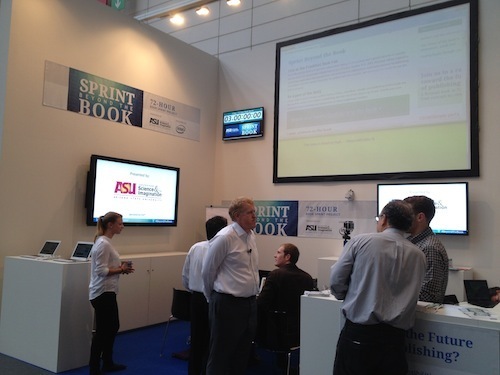
Sprint Beyond the Book: our team workspace at Frankfurt Book Fair 2013
This past week, I was in Frankfurt, Germany, as part of a team of writers, academics, and technologists, to collaborate on a multimedia book on the future of publishing.
I’ve written a series of dispatches about the experience at the VQR blog:
72 Hours on the Future of Publishing: Day 1
72 Hours on the Future of Publishing: Day 2
72 Hours on the Future of Publishing: Day 3
Here are links to all of my contributions to the future-of-publishing book:
Why I’m Here
The Blurring Line Between Reader and Writer
The Importance of Metadata in Book Discoverability
The Atomization of Publishing
The Future of Editing: Beta Readers and Agile Publishing
Book as Fluke: A Thought Experiment
The Idea of the Author Is Facing Extinction
If you have thoughts on the future of the book, you can contribute them at the website, Sprint Beyond the Book.
The post Thinking Beyond the Book: The Future of Publishing appeared first on Jane Friedman and was written by Jane Friedman.
October 9, 2013
Ether (+Bowker): Turning Corners on Self-Publishing and Amazon?
Table of Contents
Going ’round the Bend in Frankfurt
(1) Self-publishing: “The Only Discussion We Need To Be Having”
Bowker: A 59% Gain in Self-Published ISBNs
(2) Amazon: “We Will Grow Together”
Going ’round the Bend in Frankfurt
Lots of major pavilions at Frankfurt Book Fair this year seem to feature attractive, gently curving corners. Surely no more than a design idiom of the season, there’s still something right about these tidy, rounded edges in a trade show that will see more than 7,500 exhibitors and more than 300,000 attendees in three days. We’ll be shaking out the sand for weeks.
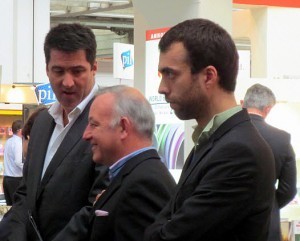
HarperCollins UK CEO Charlie Redmayne, left, chats at Frankfurt Book Fair before an appearance on the Publishing Perspectives stage.
These massive trade shows and their associated conferences are the settings in which deep-level shifts in thinking within the industry! the industry! sometimes are registered for the first time.
Here at the 2013 Frankfurt Book Fair this week, if we’re not actually walking past a couple of smoothly contoured bends, we may at least be able to peer around them.
(1) Self-publishing. We may be seeing a widespread, collective nod of recognition going on; not a big “eureka!” moment, but a frank acknowledgment that the energies of the entrepreneurial-author community no longer can be dismissed as a faddish bubble of activity nor as negligible in their effect. Bowker has stepped in to add some new edge to this concept.
(2) Amazon. Not only is there less time and energy wasted on bad-mouthing Seattle here in Frankfurt than in many such earlier gatherings, but one rant against the retailer has been met with stark derision in the publishing community, and, in a more signal moment, a major leader in the business has waved the closest thing we’ve seen yet to an olive branch.
We’ll take these two elements separately. Remember, you can follow the main tweet-storm being raised by Frankfurter Buchmesse via hashtag #fbm13.
Back from day 1 at #fbm13 – saw a lot of my favourite people, talked all my books, threw some serious shapes, ate a lot of sausage.
— Juliet Mushens (@mushenska) October 10, 2013
(1) Self-publishing: “The Only Discussion We Need To Be Having”
We’re lucky to have Jane Friedman’s fine writeup at Virginia Quarterly Review (for which she is Web Editor) on the large “town-hall” style panel I moderated yesterday at Frankfurt Academy’s CONTEC 2013 Conference here.
In her write, Is Self-Publishing the Most Important Transformation in the Publishing Industry? Friedman deftly parses the various components of the two-hour discussion generously joined at my invitation by Amazon’s Jon Fine; Kobo’s Michael Tamblyn; Curtis Brown’s Jonny Geller; author Hugh Howey of the Silo Saga; Nelson Literary’s Kristin Nelson; Books on Demand’s Dr. Florian Geuppert; journalist and author Matthias Matting; Leanpub’s Peter Armstrong; and Pubslush’s Amanda Barbara.
[image error]
The CONTEC town-hall session on “Self-Publishing and Its Implications for the Industry” in Frankfurt. Photo: Sebastian Posth
Yes, nine panelists, and at my request they sallied forth without their usual PowerPoint presentations and formal opening remarks. They allowed us to dive right into a discussion format in which audience members engaged with us.
I’m hoping to have some images from the session for you soon from the conference administration; they’ll be added here.
Love the scope of Baker &Taylor's ambition #fbm13 #hubrisanyone? http://t.co/ADiQKuSEU6
— Sheila Bounford (@SheilaB01) October 9, 2013
Echoed by Matting’s write from Munich at his Die Self-Publisher-Bibel blog in Hugh Howey, Amazon, Kobo, BoD, LeanPub, PubSlush und das Self Publishing, Friedman, who is points out that our good colleague Andrew Albanese of Publishers Weekly covered the session and then went to the conference plenary for a journalists’ wrap panel to announce: “The self-publishing discussion is the only conversation we need to be having today.”

Jane Friedman
Friedman writes:
All the changes happening in publishing were in fact encapsulated in a single two-hour panel conversation on self-publishing, with nine people from a wide cross-section of the publishing community. That’s not to say the other sessions were irrelevant or lacking in quality, but that this panel felt like its beating heart. (Or—perhaps for some—an uncontrollable tumor that threatens the entire organism.)

Sam Missingham
Geuppert, who has just surveyed authors in Books on Demand’s seven European nations of operation, brought to the table the kind of ironic finding that was corroborated for us during our session by Sam Missingham with her new results from The Bookseller’s and FutureBook‘s annual publishing census, as well as by Matting’s survey of German authors. We’ve seen this disconnect before, and it’s so interesting that I’m going to put it into italics for you:
Traditionally published authors say they need more marketing and publicity support. But self-publishing authors say they want to get contracts because they think a publisher will give them the very marketing and publicity support the traditionally published writers say they don’t get.
“What is a publisher now?” By me for @Book_Fair. http://t.co/Iua8c4h86n #fbm13
— alastair horne (@pressfuturist) October 9, 2013
This is the kind of tension that exists in the intriguing dynamics of this stage in publishing’s authorial transition, and Matting has picked out some useful quotes from our debate which, similarly, show up a lot of discrepancies in how these issues are held.
Tamblyn of Kobo: “This is the challenge for self publishing authors: there is no formula for success. It needs an accumulation of efforts, and the recipes are constantly changing.”
Fine of Amazon: “Self publishing is actually a misnomer, when authors pay for professional editing, marketing etc. The really smart guys get all the help they can.”
Geller of Curtis Brown: “Genre fiction is really taking off and succeeding with self publishing. But I don’t see any literary authors.”
Howey: “The real story of self-publishing is the number of midlist authors who are making a living of it.”
Armstrong of Leanpub: “People often forget that 50 Shades was published in progress and gained an early audience over time.”
Barbara of Pubslush: “Because we have made it very easy for authors to self-publish, we have a lot of quantity but we’ve lost some of the quality.”
Howey: “Authors should be able to see highlighted typos from readers and click ‘Accept’ to change the digital book”
Geller: “Publishers will succeed in the long run because it’s too much self-publishing if you’re a career writer.”
Howey: “We don’t appreciate yet the long tail of self-publishing. Your books are available forever.”
Geller: “I can’t believe I’m defending publishing!”
And if we closed CONTEC 2013 on Tuesday with a sense that there at least might be a real understanding that we finally must talk about self-publishing and its implications for the industry, there was a surprise second wind coming around that corner Wednesday in the form of new stats.
Our web editor @JaneFriedman discusses writing a book in 72h at the Frankfurt Book Fair: http://t.co/HweTBahha9 #fbm13 #beyondthebook
— Virginia Quarterly (@VQR) October 9, 2013
Bowker: A 59% Gain in Self-Published ISBNs
A new analysis of U.S. ISBN data byProQuest affiliate Bowker reveals that the number of self-published titles in 2012 jumped to more than 391,000, up 59 percent over 2011 and 422 percent over 2007.
 There’s more, in a press release just out from Bowker, which has an author-services site, SelfPublishedAuthor.com:
There’s more, in a press release just out from Bowker, which has an author-services site, SelfPublishedAuthor.com:
eBooks continue to gain on print, comprising 40 percent of the ISBNs that were self-published in 2012, up from just 11 percent in 2007.

Beat Barblan
Catching the lingo here? I’m really pleased with the way Beat Barblan, Bowker’s Director of Identifier Services, is phrasing all this.
Note “a new analysis of U.S. ISBN data” and “40 percent of the ISBNs that were self-published…”
This is Barblan and his team—which includes a key CONTEC speaker, Laura Dawson—aggressively phrasing what they’re saying in careful terms you don’t want to miss.
They have not told you that 40 percent of self-published books were digital. They’ve told you that 40 percent of self-published ISBNs were digital. And the analysis they’re announcing may have some big numbers, but notice that what’s jumped by 59 percent since 2011 is not self-published books. It’s self-pubished ISBNs.
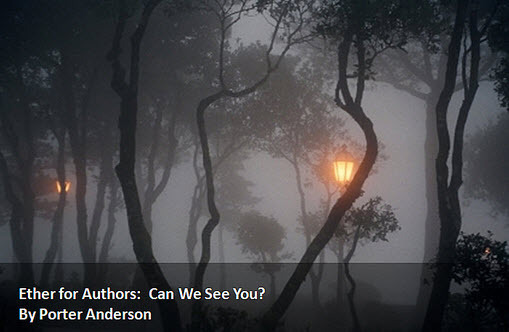 As I’ve written before—in one instance in Publishing Perspectives’ Ether for Authors—neither you nor I nor Bowker actually knows how many books are self-published and/or sold.
As I’ve written before—in one instance in Publishing Perspectives’ Ether for Authors—neither you nor I nor Bowker actually knows how many books are self-published and/or sold.
Nor do we know how many are ebooks.
We actually and simply do not know how big the self-publishing or ebook segments of the industry are. This is because large retailers including Amazon don’t release their sales and production figures. And many times, ISBNs aren’t assigned to the work.
When a book is moving through the market without an ISBN, Bowker cannot see that book. If they can’t see it, it can’t be counted.
Of course, there are reasons some self-publishing authors choose not to get ISBN assignments for their books. Some writers see the idea of paying for ISBNs as a bow to “gatekeeper” bureaucracy. (The preferred assignment is a separate ISBN for each format of a book; Bowker sells a pack of 10 ISBNs for $250, by far the most economical way for authors to buy ISBNs.) Some authors think of the ISBN only as a little-used means of searching for a book; they overlook the issue of sizing up the marketplace.
CEO of Bookish is speaking at #fbf13 and six people are listening. Which seems about right
— Don Linn (@DonLinn) October 9, 2013
I spoke with Barblan during the afternoon Wednesday, and at the CONTEC panel on self-publishing on Tuesday. His statement in the release on the new information is a clear recognition of the “entrepreneurial author”:
“The most successful self-publishers don’t view themselves as writers only, but as business owners. They invest in their businesses, hiring experts to fill skill gaps and that’s building a thriving new service infrastructure in publishing.”
 The full report will be posted to the SelfPublishedAuthor.com site next week, after a weekend presentation here in Frankfurt.
The full report will be posted to the SelfPublishedAuthor.com site next week, after a weekend presentation here in Frankfurt.
Some more elements of it in the meantime, courtesy of Barblan and his staff:
Those who intend to self-publish most often plan to bring fiction to market, followed by inspirational or spiritual works, books for children and biographies.
The majority cite finding a traditional publisher as an obstacle.
They also feel challenged by marketing – a hurdle that becomes bigger with increasing numbers of books in the market.
More than 80 percent of self-published titles came to market with support from just eight companies, including Smashwords and CreateSpace.
Another #fbf13 trend: paranormal really is dead–except witch books might work, depending on the territory and the writing.
— Ginger Clark (@Ginger_Clark) October 9, 2013
Another trend, this time on the adult side: overall "erotica" fatigue. YOU MAKE THE JOKE, I HAVE NO TIME.
— Ginger Clark (@Ginger_Clark) October 9, 2013
(2) Amazon: ”We Will Grow Together”
“My hypothesis is that [Amazon has] expanded the market . . . they have brought innovation and they’ve grown for a reason, and we will grow together.”

Markus Dohle
This is Penguin Random House CEO Markus Dohle, quoted by The Bookseller’s Josh Farrington in Dohle tells Frankfurt of Amazon ‘co-operation’.
In a CEO roundtable event with media members Wednesday at Frankfurt, Dohle was, in part, responding to commentary from London literary agent Andrew Wylie who, in Laura Bennett’s Q&A at The New Republic, The Andrew Wylie Rules, slagged Amazon as something akin to Napoleon on the march.
I think that Napoleon was a terrific guy before he started crossing national borders. Over the course of time, his temperament changed, and his behavior was insensitive to the nations he occupied.
The story has drawn more cackles than anything else, Wylie’s comments about “megalomania” don’t seem to fall on the welcoming ears that might once have met them at the Book Fair.
This time around, it seems that many who have read the story are likely to think it tells them much more about Wylie than about Amazon.

Josh Farrington
And for his part, Dohle claims the high road and stays there. As Farrington quotes him:
”Fundamentally, the relationship is about co-operation and not about confrontation. I don’t let anyone talk me into the confrontational mantra. We want to reach out to as many readers as possible. Of course, we have to manage each other, on issues such as terms, but fundamentally, we are aligned.
Dutch publisher: I need a couple of thrillers, a misery memoir and an upmarket women's commercial.
Me: and some bananas?
#frankfurtbookfair
— Jonny Geller (@JonnyGeller) October 9, 2013
Main image: Porter Anderson, Frankfurt Book Fair 2013, Hall 8.0 near the Publishing Perspectives Stage and Random House
The post Ether (+Bowker): Turning Corners on Self-Publishing and Amazon? appeared first on Jane Friedman and was written by Porter Anderson.
Self-Publishing: Is It the Most Important Conversation for Traditional Publishers?
This week, I’m at Frankfurt Book Fair in Germany, participating in a future-of-publishing experiment called Sprint Beyond the Book. Click here to read more and participate.
Yesterday, I attended CONTEC, a one-day publishing industry conference, focused on the intersection of content and technology. I wrote a blog post at VQR about the key takeaway, which centered on self-publishing. Click here to read the post.
Two free white papers were referenced during the event, of interest to authors:
Global eBook Report
A white paper on author-publisher relations, which speaks fairly directly to the threat traditional publishers face if they get cut out of the process by authors, agents, or others.
Stay tuned to Twitter (either my account or VQR’s) for timely updates from my work at Frankfurt.
The post Self-Publishing: Is It the Most Important Conversation for Traditional Publishers? appeared first on Jane Friedman and was written by Jane Friedman.
October 6, 2013
Best Business Advice for Writers: September 2013
Best Business Advice for Writers is a monthly link round-up where I share the best online articles focused on the business of writing and publishing. Share any best reads you’ve found lately in the comments.
If this round-up is helpful, then you might be interested in the digital magazine I’m launching this fall, Scratch. It’s all about the intersection of writing and money. Click here to sign up for an alert when we launch.
How to Devise the Best Marketing Strategy for the Holidays by M. Louisa Locke (@mlouisalocke)
Writes Locke: “Everywhere the discussion is raging among indie authors: should they [use] KDP Select for the holidays or not? This is an important decision because, if last holiday is any guide, the bulk of ebook sales are going to come in the ninety days after December 25, when huge numbers of new ereaders and tablets of all sorts are found gift-wrapped under the tree.” Click here to read the full post.
The Six Best Book Marketing Blogs by Chris Robley (@ChrisRobley)
This is a short and sweet round-up of blogs that focus on book marketing advice, featuring some well-known sites (The Creative Penn), and some less known (IBMG). Visit the BookBaby blog for the list.
GalleyCat’s Freelance Editor Directory by Jason Boog (@jasonboog)
GalleyCat has built a free, automatically updated directory where editors can post their services and writers can seek freelance editors. As with any system (automated or vetted), do your due diligence before hiring anyone. (Here’s excellent advice on hiring a freelance editor.)
An Open Letter to Young Freelancers by Mark
This post is from the comics world, but much of it applies to freelancers in any creative industry. Visit Thrillbent to read, where you’ll also find a great discussion thread.
5 Authors Using Social Media to Reach Readers and Sell Books by Alyssa Kritsch (@AlyssaMK)
While this article doesn’t do a deep dive on social media strategy, it does provide excellent inspiration and examples of how authors use social media well, and in a way that fits their personalities. Read more at the HootSuite blog.
Goodreads for Authors With Patrick Brown by Joanna Penn (@thecreativepenn)
New to Goodreads? Unsure how to use it as an author? Here’s a great 101 post, at The Creative Penn.
Addendums, Rights Grabs, and Agents by Kristine Rusch (@KristineRusch)
If you’re an author under contract, and you receive an addendum either from your publisher or your agent, this is a must-read post on whether or not you should sign it.
Enjoy this round-up? Don’t miss earlier installments full of goodness.
The post Best Business Advice for Writers: September 2013 appeared first on Jane Friedman and was written by Jane Friedman.
October 3, 2013
Writing on the Ether: Oil, Water, Publishers, Self-Publishers
Table of Contents
Echoes of Past Mistakes
ALLi Is Not Amused
CONTEC: Do They Have Any Business in Your Business?
Echoes of Past Mistakes
Another once-venerable publishing brand, Writers & Artists, an imprint of the Bloomsbury group, is showing little regard for writers as they move into the self-publishing arena.
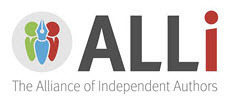 Hold that thought. Hang on to those words of Orna Ross, founder of the Alliance of Independent Authors, an international group based in the UK. The keywords I want you to note in that line from Ross are publishing brand and little regard for writers as they move into the self-publishing arena. We’ll be back to Ross shortly.
Hold that thought. Hang on to those words of Orna Ross, founder of the Alliance of Independent Authors, an international group based in the UK. The keywords I want you to note in that line from Ross are publishing brand and little regard for writers as they move into the self-publishing arena. We’ll be back to Ross shortly.
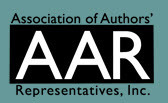 Wednesday evening in New York City, I was glad to be invited to speak on a panel of journalists who cover publishing at a session of the Association of Authors’ Representatives (AAR)—the literary agents’ organization. My colleagues on the panel were Andrew Richard Albanese of Publishers Weekly, Michael Cader (our Twitter refusenik) of Publishers Lunch, Laura Hazard Owen of GigaOM.
Wednesday evening in New York City, I was glad to be invited to speak on a panel of journalists who cover publishing at a session of the Association of Authors’ Representatives (AAR)—the literary agents’ organization. My colleagues on the panel were Andrew Richard Albanese of Publishers Weekly, Michael Cader (our Twitter refusenik) of Publishers Lunch, Laura Hazard Owen of GigaOM.
Agent Brian DeFiore organized the evening, which included a lot of frank, thoughtful exchange between agents and media types, a good event.
Our moderator was Shana Cohen of Stuart Krichevsky’s seaworthy agency. (I’ve teased Krichevsky for years that if he takes on any more books about dreadful historic disasters at sea—Sebastian Junger’s harrowing The Perfect Storm, Nathaniel Philbrick’s someone-may-have-been-eaten In the Heart of the Sea— his staff is going to be wearing life rings in the office.)
One of the questions Cohen asked us at the AAR panel in New York was what questions we might put to chiefs of the major publishing houses.
I answered that I’d like to ask major publishers how such smart, accomplished business people keep making the mistake of approaching the self-publishing phenomenon in ways that so clearly—and so predictably—hack off the author community.
 I’m referring to the Pearson-Penguin buy of Author Solutions announced in July 2012 and the November 2012 announcement of Simon & Schuster’s creation of Archway Publishing, a “self-publishing experience,” as the press release phrases it, from Author Solutions (ASI).
I’m referring to the Pearson-Penguin buy of Author Solutions announced in July 2012 and the November 2012 announcement of Simon & Schuster’s creation of Archway Publishing, a “self-publishing experience,” as the press release phrases it, from Author Solutions (ASI).
And the links in the above paragraph take you to Author Solutions’ own announcements of its Penguin parentage and its Archway deal with S&S. There’s a reason I’m linking to those ASI statements, in which you can read the company’s own way of announcing these things.
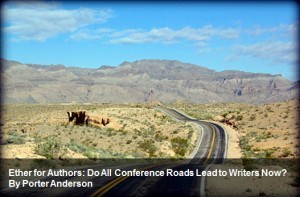 Last weekend during the Writer’s Digest West Conference (#WDCW13) in Los Angeles (I’ve written about the event in Ether for Authors: Do All Conference Roads Lead to Writers Now? at Publishing Perspectives), I met and spoke briefly with Author Solutions’ Keith Ogorek, Senior Vice-President of Marketing.
Last weekend during the Writer’s Digest West Conference (#WDCW13) in Los Angeles (I’ve written about the event in Ether for Authors: Do All Conference Roads Lead to Writers Now? at Publishing Perspectives), I met and spoke briefly with Author Solutions’ Keith Ogorek, Senior Vice-President of Marketing.
A more affable and able panelist you’d be hard-pressed to find. Ogorek made his points very well on the “New Frontiers” self-publishing panel moderated by Writer’s Digest Publisher Phil Sexton.

Keith Ogorek
Author Solutions runs a Writer’s Digest division, Abbott Press.
And Ogorek’s good contributions to the panel were announced prior to the conference by Author Solutions in this press release.
Here’s a bit of the tweeterie I was churning out during the panel on September 27 relative to the sort of comments Ogorek contributed.
#WDCW13 "New Frontiers": @keithogorek of @AuthorSolutions sees #publishers accepting #selfpub, many #agents following, if belatedly.
— Porter Anderson (@Porter_Anderson) September 27, 2013
Ogorek’s observations were the insightful, experienced comments of an executive from a company that is expanding its approach to self-publishing authors through arrangements with traditional publishers. ASI becomes those companies’ self-publishing arm.
In a quick talk between presentations in Los Angeles, Ogorek made the point to me that criticism of the company frequently is made without an attempt to get a comment from ASI. This is not good practice. It’s why I’ve chosen to link you to ASI’s own statements about its associations with Pearson-Penguin and with Simon & Schuster, and about his appearance at Writer’s Digest West. In those statements, you can read the way ASI, itself, sees and phrases these events.
Penultimate day in the office before leaving for Frankfurt. So much to do before I go. #sendreinforcements
— Don Linn (@DonLinn) October 3, 2013
Today’s central issue, however, coming to us from Ross and the Alliance, does less to call Author Solutions into specific question than it asks a larger question about the UK’s Bloomsbury and other major publishers working with author-services providers.
For this reason, I’m not engaging Ogorek directly on this one, but will be most happy to hear any comment if he feels he’d like to provide one, as I was glad to have input recently from corporate folks involved with BookExpo America and ran that commentary, in full, on the Ether.
Before leaving ASI, I want to show you something else you learn when you look for the company’s press releases in its news section on the site: announcements of legitimate deals, Author-Solutions-originating books chosen by major publishers. Many—but not all—of the titles listed have been picked up by ASI’s new parent, Penguin.
 The most lustrous of those currently listed is Sergio de la Pava’s A Naked Singularity.
The most lustrous of those currently listed is Sergio de la Pava’s A Naked Singularity.
The author published the book, himself, originally through Author Solutions’ Xlibris.
It was picked up by the University of Chicago Press. And now, it has won the 2013 PEN/Robert W. Bingham Prize.
Another such publishing deal from an Author Solutions start is Brand Damage! It’s Personal! by Larry G. Linne and Patrick Sitkins. That one was picked up by Prentice Hall, a Penguin Random House imprint to be released in January 2014 as “Brand Aid: Take Control of Your Reputation—Before Everyone Else Does.”
There are more. But today, our topic is the peculiar discomfort in which publishers find themselves when they try to get into the self-publishing service-provider gig, themselves.
 As you might recall, the Pearson-Penguin buy was particularly awkward in some observers’ minds Penguin Global Digital Director Molly Barton and her team were making a big effort at the time to win the respect of authors with their Book Country program. (More about that program, now relaunched, is in my write-up at Publishing Perspectives, Book Country: Now Opening New Territory.)
As you might recall, the Pearson-Penguin buy was particularly awkward in some observers’ minds Penguin Global Digital Director Molly Barton and her team were making a big effort at the time to win the respect of authors with their Book Country program. (More about that program, now relaunched, is in my write-up at Publishing Perspectives, Book Country: Now Opening New Territory.)
It appears that the publisher in question this time is Bloomsbury, which has attempted to expand its own author-wooing “services” effort with what it calls a “self-publishing comparison service” as part of its expanding Writers & Artists program for authors.
It’s this effort the Alliance of Independent Authors’ Orna Ross is addressing in the comment that opens today’s Ether.
@OrnaRoss figured as much since it is run by a really large publishing house
— Philanthropreneuring (@inbusiness4good) September 29, 2013
ALLi Is Not Amused
We’ve written…before about trade publishers like Penguin and Simon & Schuster showing insufficient care for authors as they trade on their brand-names to sell over-priced and under-performing services to poorly informed aspiring and beginner writers.
Now Bloomsbury is joining in — but in a different way.

Orna Ross
In her piece on the new Bloomsbury/Writers & Artists “comparison site” of self-publishing services, Warning: New Self-Publishing Resource from Writers & Artists , Ross reveals that ALLi actually was working with Bloomsbury/Writers & Artists to help create the comparison functionality—which sounds, on first hearing, like a place to go to check out one service’s offerings vs. another.
Four members of our Watchdog team — Mick Rooney, Ben Galley, Philip Lynch and I — spent a great deal of time and thought working through a pilot trial, to ensure that the ratings provided would be robust and meaningful.
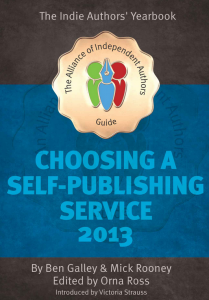 The choices of author service providers Bloomsbury was making, however, wasn’t what Ross and her associates felt they should see. She bases her ratings of such providers on ALLi’s own guide for self-publishers, Choosing a Self-Publishing Service Guidebook.
The choices of author service providers Bloomsbury was making, however, wasn’t what Ross and her associates felt they should see. She bases her ratings of such providers on ALLi’s own guide for self-publishers, Choosing a Self-Publishing Service Guidebook.
…Some of these [service provider] companies received abysmal ratings in our Choosing A Self-Publishing Service Guidebook.
So why are they on the Writers & Artists Website? Is it that the people at Bloomsbury didn’t know?
The ALLi-Writers & Artists relationship went south, it seems, when, Ross writes, “it became clear that service providers, not authors, were the focus of this endeavour. ”
She writes:
Writers should be aware that:
The suppliers on [Bloomsbury/Writers & Artists'] comparison site pay to have the author’s contact details passed onto them as a “lead”. ALLi asked that this would be made clear to authors using this service. As far as we can see, this key information does not appear anywhere on the W&A website.
Good services like Silverwood books, Matador, Ingram, Amazon, Kobo, Mill City Press etc. appear beside some companies who are the worst in the business, without any way for an author to differentiate between those who serve writers well, and those who exploit.
Using comparison websites to find #selfpub services? Warning to check recommendations carefully @IndieAuthorALLI http://t.co/HNQ3Ege6Ji
— Roz Morris (@NailYourNovel) September 30, 2013
Since Ross posted her piece, Writers & Artists has posted one of their own at their site—making our job easier because a comment is being provided.
 In Our self-publishing comparison service: where we stand (unsigned, in corporate tradition), the people behind the Bloomsbury/Writers & Authors comparison site appear to step forward to lay out the truth of who is paying whom here:
In Our self-publishing comparison service: where we stand (unsigned, in corporate tradition), the people behind the Bloomsbury/Writers & Authors comparison site appear to step forward to lay out the truth of who is paying whom here:
Providers who have elected to receive data are charged a flat fee, ensuring all those featured remain on a level playing field. Should writers wish to do so, their information on which services they are interested in is then passed on to providers. They will then be contacted by providers with further information regarding the services they have indicated within the questionnaire.
Even with Bloomsbury/Writers & Artists now stating clearly—seemingly thanks to Ross’ and ALLi’s public commentary—that providers are paying to attract author interest by being part of the comparison program, the “comparison” term, itself is questionable.
What a “comparison” turns out to be when you work your way through the Bloomsbury/Writers & Artists questionnaire, which you can find here, is a price-quote sent to you by one or more providers you choose from the list.
Bloomsbury/Writers & Artists makes some other interesting offers to authors, these in direct exchange for money, aside from the “comparison service.”
For example, you can buy a “How Strong Is Your Book Idea?” appraisal for £119.99.
Or a “Beat the Rejection Clinic” for £199.
I hear authors and creative folk in general are all happy to work for nothing, so no problem there.
— Sam Missingham (@samatlounge) October 1, 2013
Another interesting twist—Bloomsbury/Writers & Artists’ statement following the ALLi post includes this, emphasis mine:
In addition to the comparison service itself, there are also articles from industry experts (from editorial and marketing advice through to warning signs to watch out for in a provider); an ever-evolving glossary of industry terms; an expanding FAQ section; and interviews with self-published authors. These features have all been included with writers in mind. Our goal is not only to help demystify the self-publishing process, but also develop an accessible, impartial service that puts writers in touch with the providers best-suited to moving their novel forwards.
So we have a firm line in the sand. ALLi sees the Bloomsbury/Writers & Artists “comparison site” as being about the providers who pay to be on it, not about authors who might come to find them. And Bloomsbury/Writers & Artists is using the phrase “with writers in mind.”
In short? This is a confusing presentation of something called a “comparison.” In all fairness, we should include this note from Bloomsbury/Writers & Artists, which makes it seem as if Ross’ and ALLi’s concerns may not be a surprise:
We are, of course, expecting lots of feedback from writers using our service, and we’ve already planned how we’re going to put this to good use. Once we’ve received sufficient data from writers, a second ratings section will be introduced in the results table. This will allow authors the opportunity to filter results by both ‘Best Match’ and ‘User Reviews’, further strengthening the transparency of the platform and allowing freelancers to rank alongside established companies established within the industry.
“The transparency of the platform” sounds good to me. What Ross and ALLi are reporting in careful, level-headed language, is that they believe such transparency is not in place and may not, indeed, be an actual goal of the Bloomsbury/Writers & Artists.
People, don't try to contact me on LinkedIn. I check it about as regularly as I see my dentist–every six months.
— Ginger Clark (@Ginger_Clark) October 2, 2013
The bottom line lies in each writer’s assessment of his or her own needs and resources.
However you feel about Bloomsbury/Writers & Artists or about Ross and ALLi or about one service provider or another, the real question here is about publishers moving into the self-publishing space, some quite aggressively, with offers of what are inevitably presented as highly useful, writer-supportive products.
While many legacy publishers may not like to think about how large the self-publishing movement is (Smashwords alone, has announced that writers have self-published more than 250,000 books on its platform), it appears that making money off self-publishing authors is just fine by the traditional houses.
And that is, at the least, an unattractive reality.
Weird T-shirts designed to confuse Facebook's auto-tagging face recognizer: http://t.co/paJg7O80y6 #wishidthoughtofthis (via @hmason
— Golan Levin (@golan) October 2, 2013
CONTEC: Do They Have Any Business in Your Business?
I don’t know whether publishers operating in the self-publishing services space will be a specific topic of discussion, the coming CONTEC Frankfurt 2013 Conference’s extended “interactive learning lab” session, “Self-Publishing and Its Implications for the Industry,” will be looking at many such issues on Tuesday, October 8.
 More about that panel is here in a piece from Publishing Perspectives on it, Self-Publishing and the Industry: Implications and Impact. Our purposefully large panel for the session includes author Hugh Howey; Kristin Nelson of Nelson Literary; Peter Armstrong of Leanpub; Amanda Barbara of Pubslush; Jon Fine of Amazon; Jonny Geller of Curtis Brown; Florian Geuppert of Books on Demand; journalist Matthias Matting; and Michael Tamblyn of Kobo.
More about that panel is here in a piece from Publishing Perspectives on it, Self-Publishing and the Industry: Implications and Impact. Our purposefully large panel for the session includes author Hugh Howey; Kristin Nelson of Nelson Literary; Peter Armstrong of Leanpub; Amanda Barbara of Pubslush; Jon Fine of Amazon; Jonny Geller of Curtis Brown; Florian Geuppert of Books on Demand; journalist Matthias Matting; and Michael Tamblyn of Kobo.
Both Jane Friedman, host of the Ether, and I will be on-hand at the CONTEC Conference all day and you’re most welcome to follow the many fine sessions from this day-before program at Frankfurt Book Fair through hashtag #contec13. For the Book Fair, itself, the hashtag is #fbm13.
Have you availed yourself of “author services” offered by a traditional publisher? What was your experience? How do you feel about traditional houses creating these programs to sell to self-publishing authors?
A poem on the Tube to make you smile for #NationalPoetryDay #TravelBetterLondon pic.twitter.com/zR8f9bafas via @copyslut
— Jonny Geller (@JonnyGeller) October 3, 2013
Main image: iStockphoto – Serasker
The post Writing on the Ether: Oil, Water, Publishers, Self-Publishers appeared first on Jane Friedman and was written by Porter Anderson.
September 30, 2013
Principles of Strong Historical Fiction
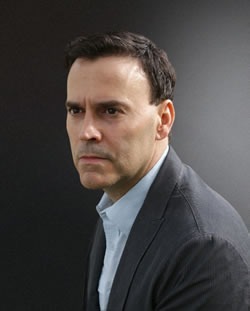
Photo by Susannah Shive
What are the rules for what can and can’t be done with historical fiction? How much license can a writer take with the facts?
In the latest Glimmer Train bulletin, author R. Clifton Spargo offers a few “rules” for historical fiction writers, including:
There’s no reason to abide by the scripts of biographies and histories. Why not take your characters off the grid? Almost anything can happen once Scott and Zelda tour a derelict bullfighting ring, or stay in a Havana hotel made famous by Hemingway, or find themselves escorted by a mysterious Cuban and his girl to a Havana juke joint—even if the real-life Zelda and Scott never visited, as far as we know, any of these places.
To read more advice from Spargo, click here.
Other features this month from Glimmer Train:
Building a Collection of Stories by Abbie Geni
You’re a Fiction Writing Professor by Justin Kramon
The Fear of Not Saying Interesting Things by Kimberly Bunker
Why I Chose to Write About a Father-Son Relationship by Catherine O’Flynn
The post Principles of Strong Historical Fiction appeared first on Jane Friedman and was written by Jane Friedman.
September 27, 2013
Why Don’t Publishers Believe in Author Websites?

photo by Curtis Palmer / via Flickr
It’s not unusual for authors to be told by their publishers that an author website isn’t necessary or effective. Publishers may advise authors that they’re better off creating and maintaining a Facebook page instead. (I address the flaws in that strategy here.)
It came up again, yesterday, at a Digital Book World marketing conference. I didn’t attend, but I followed the Twitter stream. Here’s the conversation that happened.
#DBWMP @rachelchounyc "I don't believe in #author Web sites for a lot of authors. I'd rather them spend time on social." @OpenRoadMedia
— Porter Anderson (@Porter_Anderson) September 26, 2013
Wow, really? MT @Porter_Anderson: "I don't believe in author sites for alot of authors. I'd rather them spend time on social" @rachelchounyc
— Jane Friedman (@JaneFriedman) September 26, 2013
@JaneFriedman @porter_anderson really. Most are outdated by time they launch. Didn't say all authors though. I'd rather buy URL & redirect.
— Rachel Packman Chou (@rachelchounyc) September 26, 2013
@rachelchounyc A site outdated by the time it launches? Ouch. I'm not sure most author sites require that level of time/planning.
— Jane Friedman (@JaneFriedman) September 26, 2013
@JaneFriedman true
I think this is in the context of author requests for bells and whistles and more than a business card/brochure.
— Rachel Packman Chou (@rachelchounyc) September 26, 2013
It got me thinking more deeply about why publishers (in this case, Open Road Media, a progressive media company focused on e-books, founded by The Other Jane Friedman) would advise authors to forget the website, or what I consider the No. 1 calling card for a digital-age author. In my experience of having a website *and* being active on social, I would feel hobbled if either piece went away. Social is more powerful with my website, and my website is more powerful with social. That’s not to say there can’t be varying strategies and tools for execution (and there have to be—every author career is different), but to say “no” to an author website for most authors? That seems like an opinion formed in 2005 that hasn’t been seriously revisited or challenged.
But publishers aren’t stupid or inexperienced. They shepherd thousands of new and experienced authors and know what sells books. What’s going on here? Am I horribly wrong in continuing to advise authors to own and control their own website as a long-term priority? Here’s what I think is going on.
1. Publishers don’t believe websites are effective for the time put into them—they create an unprofitable time sink.
I can see how and why this might happen, since most authors are not educated on best practices of websites, what websites are good at, and how they integrate into a larger online presence. There’s a learning curve that no publisher can be or wants to be involved in, so it becomes easier to say, “Don’t bother (because you won’t do it right).”
If the author decides to establish a website anyway, the publisher may be rightly concerned that the author isn’t motivated or capable of maintaining it. Sometimes a bad website or out-of-date website can be more damaging than no website at all. Even if it is up to date, what if the author’s website doesn’t link to all retailers, and it offends an account? What if the author is saying or doing things that make life difficult for the publisher? (I experienced this to some degree at F+W Media, where the editors received requests from marketing: Please tell your author to change X on his site.)
What remedies might there be?
Educate authors. No publisher really wants to do this, though I think it’s in their best interest. At the very least, publishers could write up a downloadable guide or record an hour-long webinar that’s periodically updated.
Advise authors to use platforms that don’t require technical knowledge to maintain. We’re no longer living in the days of the webmaster; any individual who uses Word or Gmail can also learn to update a website. Some think WordPress is too complicated. But there are a range of solutions out there: SquareSpace, WordPress.com over self-hosting, even Blogspot will do.
Clearly advise authors what constitutes a waste of time. No author site should take so long to launch that it’s out of date by the time it’s live. And there’s no excuse for an out-of-date site if you’re using a platform like WordPress.
Bottom line: I think it’s a mistake and a disservice to authors to make them think or believe a website is some sophisticated piece of technology that they can’t handle or maintain. I expect more, and I’ve seen many writers, some over 60 years of age, successfully start and maintain their sites after being encouraged and educated in a positive and empowered way. This is part of being a capable author in the digital age, if you want to grow your career over the next 5, 10, or 20 years.
2. Publishers see better, clearer results from other types of activities, such as Facebook or Twitter social engagement, which may demand less of the author.
As a colleague said on Twitter, it’s important to start somewhere, anywhere. I also believe in the power of incremental progress; you don’t have to launch and perfect everything at once. Start small, and build your skills and presence over time. A Facebook start for most authors feels doable and sustainable—and sustainability is key.
This also helps authors focus on social marketing and soft-selling, which—even if they don’t know what that means—they might be more comfortable and successful at, if they’re new to online media. Plus, more than 1 billion people use Facebook. An author, if invested in it, may reach more people there and fewer people at their site, at least initially. (Go where the fish are.)
Yet I have a hard time endorsing a social-only approach when you, the author, are at the mercy of the social media tool for reaching your audience. You can never control what Facebook or any other site does—with its design, with its user interface, with your likes/followers, with its functionality, with its ad displays. And if and when it goes out of favor, you’ll have to rebuild somewhere else—whereas with a website, you only get stronger and better over time, assuming you don’t abandon it (and why would you, if you’re still writing and publishing?). When I first launched my website, it was a shadow of what you see now. (I discuss that journey, in depth, in this 20-minute video.)
Finally, Facebook is not an ideal set up for delivering straight-forward information. It’s better at conversation and ongoing connections, rather than delivering things such as media kits, official author bios, event listings, book club materials, and so on. Sure, you can put those things on Facebook, but that’s not an ideal setting for it, especially when people are typing your name or book title into Google. (And what about all those people who don’t use social media?)
3. Publishers aren’t sufficiently invested in the author directly reaching an audience on their own–or don’t believe it happens at a meaningful enough scale, except for a minority.
We all hear about agents and editors who want authors with a “platform”—which means authors who can directly reach readers. This mitigates the risk involved in publishing a book because there’s a ready-to-go audience that the publisher doesn’t have to find.
This presents something of a paradox. How can publishers seek authors with platform (which often involves an online presence that can be quantified) AND claim author websites aren’t terribly effective? But I can see the rationale. If the platform is essentially established ahead of time—and that process probably took the author years—it’s integral, but it’s difficult for an author, on her own, to establish a meaningful platform from the time a book is contracted to the release date, especially if she’s starting from ground zero. (Though, undoubtedly, the author will still be advised to participate in some range of online marketing activities, without being educated on what’s good for the short-term vs long-term, and may not realize that getting on Twitter is kind of pointless if you’re only doing it because your publisher said so.)
Put another way: Some authors are motivated and pretty good at the online and digital platform stuff (and at reaching an audience), and some aren’t. And for those who aren’t, the publisher may believe it’s not worth bothering because the payoff won’t be there in time for the publisher to see an impact on sales.
That seems rather focused on the short-term, or on the publisher’s immediate ROI rather than the author’s long-term career.
I’d argue it’s now the publisher’s job to help authors connect with readers—to be marketing partners. And if they’re going to be a valuable marketing partner, it means educating authors on how to do this stuff for the long haul even if the authors think they’re “bad” at it—which requires authors undergoing an attitude adjustment, not a miracle injection of computer-programming know-how.
There could be another reason publishers aren’t helping authors with this: it takes away their power if the author can reach readers without them. I don’t honestly believe this is motivating publishers in their advice to authors, but when you see hybrid authors such as Hugh Howey, CJ Lyons, Barbara Freethy, and others who do well because they’ve made the investment of reaching readers directly, publishers have less negotiating power. Being in direct contact with readers (through your own site, blog, e-mail newsletter, wherever) is like money in your pocket, a long-term investment that pays off over time. Any of the authors I mentioned above would confirm this. Sylvia Day, speaking at an industry conference earlier this year, said that publishers have to offer “a comprehensive marketing plan that covers things that I’m not doing myself. I expect them to hit a market that I’m not already reaching. You need to find me a new audience, to broaden my audience. As far as digital is concerned, you cannot compete with what I’m doing on my own. You have to knock my socks off with a brilliant marketing plan to be my publisher.”
There are probably two questions in this whole conversation that are most debatable and most difficult to answer, at least on a broad, general, and continuing level:
How much of an impact can an author website have on book sales over the long term, versus other strategies such as metadata optimization, Amazon promotion, Goodreads advertising, traditional media/PR, etc? This assumes that sales is the only or primary goal, and that other benefits are negligible (which is also highly debatable!).
Assuming the overall impact is meaningful, how many authors have the aptitude, patience, and/or perseverance to be like Sylvia Day? Can this be taught effectively, and if so, is it worth an author taking time and energy away from her writing? (And/or: Should an author spend money on someone else doing it?)
I say it’s worthwhile (because I’ve experienced the benefits firsthand), but I understand why others say no.
Update
For more on this topic, read the Digital Book World piece by Jason Allen Ashlock, which accurately summarizes both sides of this debate.
Darcy Pattison responds with “Why Authors Should Believe in Their Websites” and links to a Codex study that found visiting an author’s website is the leading way that book readers support and get to know their favorite authors better.
The post Why Don’t Publishers Believe in Author Websites? appeared first on Jane Friedman and was written by Jane Friedman.
September 26, 2013
Writing on the Ether: Contrarians Among Us
Table of Contents
Three Valuable Views
A Word for the Publishers
Humming the Bookstore
And Just Write It Already
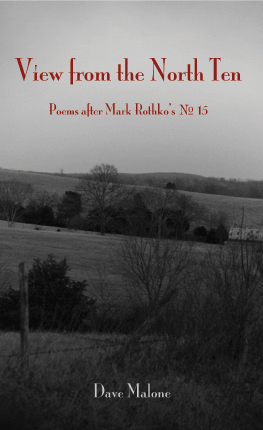 Porter Anderson.
Porter Anderson.
September 20, 2013
A Call to Disarm Technology & Hype (And Boost Your Writing Productivity)

Photo by fatllama / Flickr
Today’s guest post is by author, editor, and publisher L.L. Barkat (@llbarkat).
Stop the hype. Please. Your sanity and mine are at stake. And maybe the future of our writing.
In a recent article, Technology: Finding Our Way Back from the Flatness, I addressed the issue of how the internet and other technology keeps us on insanely high alert, ultimately producing an effect where we attend to everything and we attend to nothing (deeply).
It is my theory that this high-alert state is producing a fatigue that’s detrimental not only to our psyches and relationships, but also to the quality of our professional output. Fatigue is one reason I’ve recommended it is time for (many) writers to stop blogging.
This fatigue may have its roots in actual physiology. In The Plateau Effect: Getting from Stuck to Success, Sullivan and Thompson have discussed the chemical hits we receive when we see something like a new Facebook or e-mail alert. (I’m reminded of a dear friend who found herself diagnosed with adrenal exhaustion due to a 10-cup-a-day coffee habit. It took her months to come back from that and to rebound in her professional life.)
Sullivan and Thompson take the physiological issue a step further and declare that the alert-driven chemical hits to our brain may be producing actual addiction that keeps us in a negative cycle of interruption, costing the U.S. a cool $588 billion per year in productivity losses. To bring that down to a more personal level, when you let yourself get carried away by the high-alert cycle and give in to its constant interruptions, you lose 10 IQ points in each interruption moment (“the equivalent of not sleeping for thirty-six hours—or double the impact of smoking marijuana”), and it takes you about twenty-five minutes to fully return to your original project.
Some large companies like Intel have begun to fight this trend with Quiet Zones aimed at providing a more restful work environment, to increase productivity and literally cut their losses. The Quiet Zones are four-hour spans of time without meetings or technological connectivity.
Staking Out & Creating Quiet Zones
You can start by organizing a work-free space as part of your regular writing environment. But you can also, perhaps, commit to stopping the hype—halting a high-alert way of communicating—for the sake of helping create a culture that will benefit both you and others.
As an occasional book reviewer, a publisher, and managing editor of a top poetry site, I have committed to halting the high-alert mode that is so common in the current book and media industry. When I review a book, I do not recommend it to everyone as the must-read of the decade (!!!). I decide who might actually benefit from the work, if anyone, and why. I might also include cautions about who would not benefit from the book, as in this review of A Broken Thing: Poets on the Line—where I recommend that the book not be used as part of a vigorous classroom reading schedule. Likewise, as a publisher and a managing editor, I work hard to ensure that our group acts as a curator that sifts and sorts down to the good stuff and then shares it in ways that say, “This is for you if …”
The Bottom Line
Do you find yourself less productive as a writer, or fatigued, or working at lower levels of quality than you’d like to be? Maybe it’s time to seek out places that have stopped the hype—to create a quiet zone, if you will, around yourself, your work, and the work of others—for the future of your writing and the culture at large.
The post A Call to Disarm Technology & Hype (And Boost Your Writing Productivity) appeared first on Jane Friedman and was written by L.L. Barkat.
Jane Friedman
- Jane Friedman's profile
- 1882 followers


